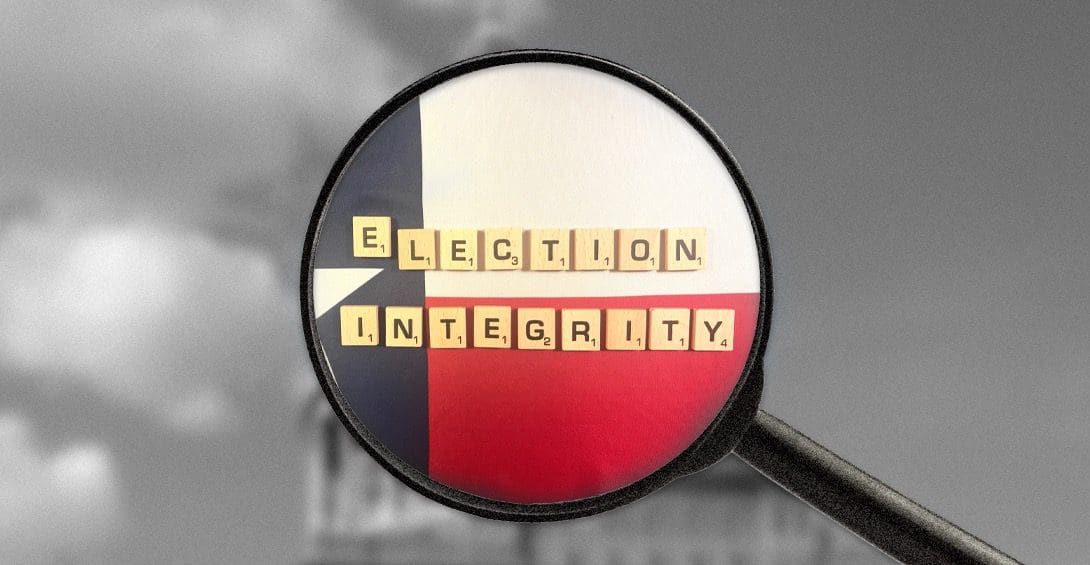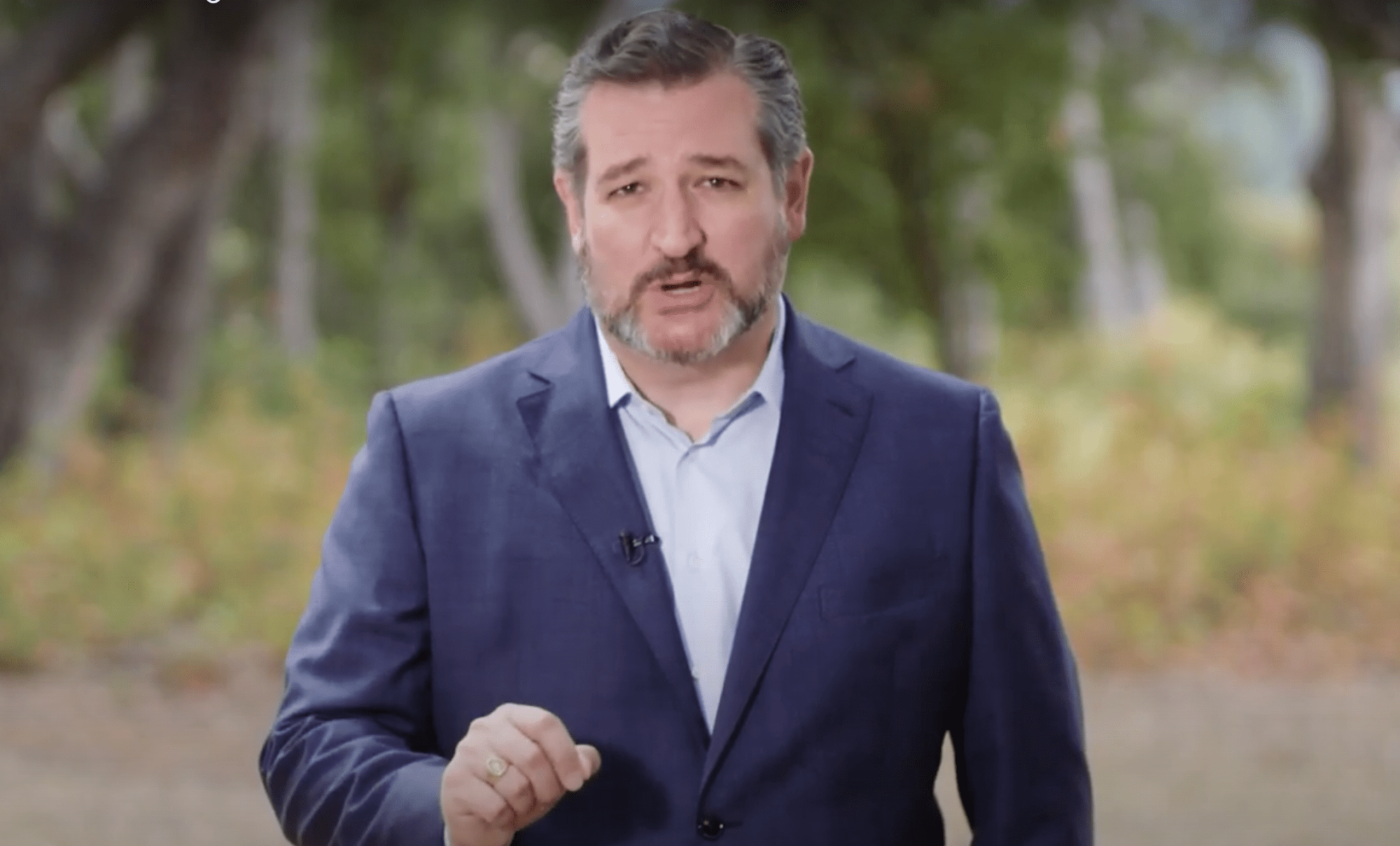Election integrity reform is mostly dead this year due to mismanagement by Republicans in the Texas Legislature. But it may be revived—if the same lawmakers who bungled the priority over the past several months can do better in a special legislative session.
With the 140-day regular session officially over as of May 31, election integrity advocates are disappointed the Republican-controlled Legislature failed (again) to pass most of their priorities to better secure Texas elections.
“Quite frankly, this session has been a letdown,” said Jill Glover, chair of the Republican Party of Texas Legislative Priorities Committee, which identifies and champions proposed laws that align with the party’s priority-issue policy goals.
Election integrity was the No. 1 RPT legislative priority this session, and a top goal for other conservative grassroots activists as well, after lawmakers failed to pass proposed election reforms in past sessions. It was also the only RPT priority given fast-track emergency status by Republican Gov. Greg Abbott back on February 1.
Lt. Gov. Dan Patrick and House Speaker Dade Phelan also publicly endorsed major election reform bills filed in the House and Senate.
Yet lawmakers in both chambers failed to consider election integrity (or any of the governor’s emergency items) until the legislative session was beyond the first 60 days.
Lawmakers did manage to pass a handful of election bills, but conservatives’ top-priority comprehensive election reform bill was slow-rolled by Republican lawmakers and finally killed by a Democrat maneuver just hours before the final deadline to pass legislation.
Glover said she would give lawmakers a score of one out of 10 on election integrity.
“The big omnibus bill died,” she said. “Our Republicans did not manage the calendar as well as they should have.”
In fact, the omnibus election integrity bill that eventually died was a mashup of two very different comprehensive bills: House Bill 6 by State Rep. Briscoe Cain (R–Deer Park) and Senate Bill 7 by State Sen. Bryan Hughes (R–Mineola), each containing a wide range of reforms.
Early finger-pointing blamed Democrats for the bill’s last-minute demise, but Republicans’ decision to focus on overloaded—and significantly different—omnibus bills helped derail election integrity reform.
So did a decision by Cain to completely swap the contents of his own bill into Hughes’—three weeks after the House received SB 7 from the Senate. That prevented the full House from ever hearing the Senate-passed version of SB 7, considered by activists to be the one most aligned with their priorities.
That maneuver guaranteed a challenging push in the final days of the session for House and Senate Republicans to reconcile the two versions of SB 7, then sell it to members of both chambers. The compromise bill collapsed under its own weight, killing grassroots’ priorities.
Priorities
While interest in securing the vote intensified during 2020 as voting rules were loosened without legislative oversight, this year’s election reform priorities were much the same as in past sessions: clean up voter rolls, secure mail ballots, stop illegal voter assistance, make sure voting machines produce accurate results, and punish cheaters.
The Lone Star Agenda, released by grassroots conservatives in August 2019, included a call to improve election integrity by verifying voters’ citizenship, increasing penalties for vote harvesting, requiring paper audit trails for electronic voting machines, and removing the secretary of state’s ability to grant waivers of existing laws to local election officials.
Some new issues did emerge in 2020. Local election officials across the state used COVID as an excuse to make up their own voting rules, which Democrats hoped to make permanent; outside money influenced how elections were administered; and there was the renewed threat of a federal takeover of state elections.
At last summer’s convention, Republican Party of Texas delegates made election integrity their top legislative priority for second session in a row. Specific goals included requiring citizenship verification and setting felony penalties for election code violations.
The election integrity watchdog group Direct Action Texas prioritized cleaning up voter rolls, reforming mail-in balloting, and banning the use of outside money to fund government election offices.
The Texas Freedom Caucus, a group of Republican House members who tend to support conservative legislation, released a similar list of election integrity priorities.
“The legislative session will be a failure if we don’t reform our electoral process,” Cain, a Freedom Caucus member who chaired the House Elections Committee and shepherded HB 6/SB 7 through the House legislative process, told Spectrum News in March.
The RPT and other groups identified several House and Senate bills that met their election integrity goals, including the two top-tier omnibus election bills. Then they waited.
“In the last two legislative sessions, Abbott failed to pass election integrity and ballot security and failed to get the job done on verification of the registered voter list to remove illegal aliens, felons, the deceased, and double registrations,” JoAnn Fleming, executive director of the influential activist group Grassroots America – We the People PAC, told Texas Scorecard last month, when it appeared lawmakers might again drop the ball. “We are totally mystified as to how and why this emergency priority for Governor Abbott is being addressed this late in session.”
Other state legislatures passed a number of these election reforms this year, within much shorter sessions, and Republican governors in Georgia and Florida have already signed comprehensive election integrity bills.
For the most part, Texas’ Republican lawmakers failed to deliver results.
Advocates are now looking ahead at what remains to be accomplished.
What Survived
While much of the election reform work wasn’t completed, lawmakers did send a handful of key election integrity bills to the governor’s desk:
- House Bill 574, originally crafted to make all election fraud crimes felonies (an RPT-priority policy goal), creates two new offenses for officials who intentionally count invalid votes or fail to count valid votes and makes them second-degree felonies.
- House Bill 1382 initiates a statewide online mail-ballot tracking system—a helpful tool for voters and election administrators, and for spotting intentionally misdirected mail ballots.
- House Bill 2283 keeps outside cash from influencing how Texas elections are run by limiting to $1,000 most private donations to county officials for use in administering elections. It wasn’t an RPT priority, as the millions of “ZuckBucks” Facebook founder Mark Zuckerberg funneled to select election offices last fall hadn’t become an issue prior to the party’s 2020 convention, but it’s considered a key election integrity reform.
- House Bill HB 3920 adds a statement to mail-ballot applications for voters who check “disability” to affirm they have a condition that keeps them from voting at the polls—a deterrent to vote harvesters who use the excuse to request easily manipulated mail ballots for ineligible voters.
- Senate Bill 598, a priority carried over from last session that drew bipartisan support, requires all Texas voting systems to produce auditable paper trails by September 2026, initiates risk-limiting audits, and offers state funds to help counties buy or upgrade equipment.
- Senate Bill 1111 clarifies voters must register at a place they actually inhabit—not at a post office box or commercial address—and may not establish residency to influence the outcome of an election. It wasn’t an RPT priority but was filed in response to a 2018 discovery of voters registered at UPS stores and other private P.O. box addresses and casting votes in districts where they didn’t live.
- Senate Bill 1113 authorizes the secretary of state’s office to withhold state funding from county election officials who fail to follow rules for canceling registrations of ineligible voters. Holding election officials accountable to following the law was one of the RPT’s priority election-policy goals.
What Died and Why
Every other election integrity policy goal died, including:
- New procedures for verifying voters’ citizenship;
- Felony penalties for all election fraud crimes;
- Stronger laws against organized vote harvesting (enacted by Florida and Georgia);
- Voter ID for mail ballots, in line with in-person voting (enacted by Florida and Georgia);
- Standard election administration rules precluding drive-thru and 24-hour voting and sending unsolicited mail-ballot applications (COVID-era improvisations by local officials and funded by ZuckBucks that Democrats hoped to make permanent);
- Curbing coerced voter assistance at the polls;
- Poll watcher protections, so they can actually see what election officials are doing (a response to multiple lawsuits charging officials with blocking Republican-appointed watchers);
- Video surveillance of ballot-counting at central count (already used in many states);
- Preventing officials from altering or suspending election rules; and
- Expedited court actions on election-related cases.
Most of these reforms were included in the original versions of either HB 6 or SB 7; a few of the reforms were in both.
Individual bills addressing many of these priorities (tracked all session by Texas Scorecard) were allowed to languish, presumably because lawmakers believed they would pass as part of an omnibus bill.
A look at the timelines for both omnibus bills shows the Senate moved quickly, while the House lagged—a recurring pattern within the Texas Legislature.
“For three sessions running, the Senate has passed meaningful election integrity reform, and the House has killed it,” longtime advocate Daniel Greer said earlier this week on The Luke Macias Show.
The Senate passed SB 7 on April 1. That same day, the House held its first public committee hearing on HB 6, then took no further action for almost a month. After receiving SB 7 from the Senate on April 6, Cain waited until April 29 to take it up in his committee, where he stripped all of SB 7’s original language and replaced it with the contents of HB 6.
When HB 6 came to the House floor on May 6, Cain called up the substitute SB 7 (with HB 6 language) and accepted 18 amendments before the House finally passed the bill on May 7.
The completely changed version of SB 7 was returned to the Senate on May 17. As expected, the Senate called for a conference committee to reconcile the substantial differences.
During 12 days of dealings that happened outside of public scrutiny, Hughes, Cain, and other Republicans hammered out a compromise called a conference committee report that included provisions from both HB 6 and SB 7, as well as items never previously heard by either chamber. The report was produced May 29 and taken up by the Senate, which approved the report on May 30 and sent it to the House.
After spending the entire session (minus the extra six weeks afforded by emergency status) maneuvering the bill through the legislative process, Republican lawmakers managed to position the bill on the final House calendar of the session with just hours remaining to pass legislation.
At that point, Democrats were able to kill the bill by simply leaving the House chamber (after Phelan assured them he wouldn’t use his authority to block them), breaking the two-thirds quorum needed to take a final vote.
But the real culprits responsible for SB 7’s demise were Republicans, who control the House and Senate, wrote the omnibus election integrity bills, chaired the committees that heard the bills, and dominated the conference committee that drafted and approved the final compromise.
“SB 7 should have and could have been finished earlier and prioritized as such to not be on the final day,” said State Rep. Tony Tinderholt (R–Arlington). “By not passing it sooner, Republicans enabled Democrats to walk out.”
“Texans deserve and expect legislation concerning election integrity,” Tinderholt added, urging Abbott to call lawmakers back “immediately” to pass the priority.
Second Chance at Life
Abbott has said election integrity will be part of a special session agenda and added lawmakers “will be expected to have worked out the details when they arrive at the Capitol.”
Any new election reform bill or bills will likely be pared down from SB 7.
Among the other priorities left undone, advocates are expected to focus on standardizing election administration processes that were reimagined by local officials during COVID without legislative oversight, as well as safeguarding mail-ballot voting with a voter ID requirement (like Georgia, Texas’ signature verification process was challenged in a federal lawsuit).
Phelan suggested lawmakers try “single shot” bills instead of one comprehensive reform bill during the special session.
“I’ve never been a big fan of big omnibus bills to begin with,” he said in a Capital Tonight interview a day after the regular session ended.
Regardless of which “side” was most responsible for killing SB 7 during the regular session, or what form new election integrity proposals take in a special session, the same Republicans in both chambers will have to work together to pass grassroots’ priority reforms and better secure Texas elections.





